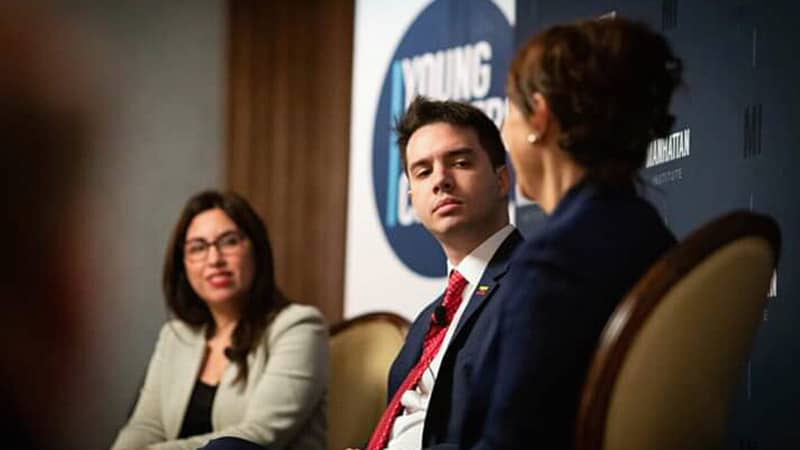

Venezuelan political activist, asylum-seeker and TFAS Outreach Fellow Andrés Guilarte recalls his childhood as a beautiful time in the age of Venezuelan prosperity. Born in 1994, Guilarte witnessed a dramatic shift in his corner of the world as the country that had long been implementing socialist policies continued its downward spiral with the election of Hugo Chavez in the late 1990s. In the span of just a few years, millions of Venezuelans fled the country to escape the ever-worsening poverty and violence.
Guilarte is one of these individuals. However, he wasn’t always an anti-socialist. In fact, he considered himself a socialist in high school. Several of his family members supported the ideology, so he never really questioned it.
It wasn’t until his college years that he became more involved in the political arena. Some friends at the Central University of Venezuela encouraged him to join the debate club. His involvement in this organization, in addition to his studies of international relations, led him to discover a passion for language and politics.
Guilarte ventured into the political movement through clubs at his university, including the debate club. He chose to join the smallest political organization because he liked the idea of building something from the ground up. That group turned out to be part of the anti-socialist liberty movement. He eventually became the president of this club and later of his university’s student government. He also joined Students for Liberty, and from there his activism mounted.
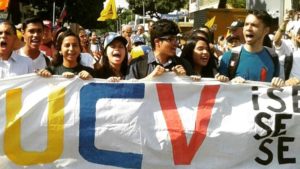
Guilarte’s fellow citizens were speaking out too. He joined the movement at a time when pro-freedom protests and activism were building. He felt a sense of duty and responsibility to participate in the protests because of his leadership position. Guilarte felt he had no choice but to get involved in the movement. The understanding that he served as a leader and role model to his peers strengthened his resolve and bolstered his courage.
“What you see in the news, I have to be there,” he told his mom before going to the protests. “There’s no choice. I have to be there.”
Guilarte described protesting as “emotionally and morally draining” and as something “you have to put your whole self into.” He felt scared but pushed through the fear, even when facing the very real threat of imprisonment, injury or death. He faced people who wouldn’t have hesitated to kill him. It may well be a miracle that he escaped the country with his life.
Looking back at those days, Guilarte says that sometimes he feels like it was useless, like there was no point. People died and families were torn apart, but the people who were in power then are still in power now.
Despite the frustration, he has hope that one day his country will return to a flourishing democracy. This hope stands as a mark of Guilarte’s resilience. To have lived through such hardship and still retain that spark of excitement for life and a better future shows just how remarkable he is.
ARRIVING IN AMERICA
Guilarte came to the U.S. in January 2019 for an internship with the Cato Institute. The first thing he noticed was all the stores in the Miami airport, stocked to the ceiling with merchandise, where people paid cash for their goods. What sounds ordinary to U.S. citizens was exceptional for Guilarte. He had never seen such abundance, which many Americans take for granted.
Another thing he noticed was the weather. Being from the Caribbean coast, Guilarte had never experienced cold weather before. When he traveled up the East Coast in January, he saw snow for the first time and was happy to be in a completely different environment. He connected warm weather with the traumatizing experiences he had back home. Guilarte loves fall and winter in the States because it helps him feel further away from the pain of his past.
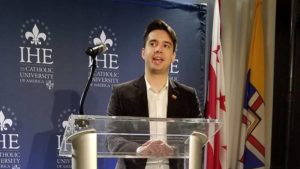
As his Cato internship was ending, TFAS was seeking new avenues to reach young leaders with the truth about the dangers of socialism. TFAS supporter Frayda Levy heard Guilarte’s story and thought he would be a perfect fit for TFAS’s new Venezuela Project. She reached out to him and Jorge Galicia, another Venezuelan asylum-seeker, and recruited them as speakers for the project. The pair spent the next few months studying the history of Venezuela and the real effects of socialism. Working with Levy and a presentation coach, they spent countless hours refining their English, public speaking and storytelling skills to perfect the presentations they would soon share with student audiences nationwide. They worked diligently on their vocabulary and pronunciation so they could effectively share their message. That fall, with funding provided by Levy and her husband, Guilarte gave his first presentation to college students. He described the feeling of this new opportunity as surreal.
Coming to TFAS was surreal because it was – well, it’s like when you think you won’t have any opportunities, and suddenly you’re given this huge opportunity you never imagined.” – Andrés Guilarte, TFAS Outreach Fellow
“My first few months in the U.S. were really hard, so I never imagined I would get a call out of the blue to come to D.C.,” he said. “Coming to TFAS was surreal because it was – well, it’s like when you think you won’t have any opportunities, and suddenly you’re given this huge opportunity you never imagined. That’s the way I saw it.”
Guilarte thoroughly enjoys traveling around the U.S. and connecting with college students on campuses across the country. But his outreach journey doesn’t stop at the U.S.’s borders. After the pandemic hit, both he and Jorge repurposed their presentations for a virtual setting and delivered it to college students in several other countries throughout the Western Hemisphere. He said his message is well-received by most students, even those who do not share the same ideas or opinions. It gives him hope for the future of civil discourse in this country.
“Since I used to agree with socialism, I understand where these students are coming from,” Guilarte said. “I speak to them as if I were speaking to my younger self. I think they are just misinformed, but they have credible reasons to believe in socialism. I just try to learn why they believe what they do, and from there guide them toward economic realities.”
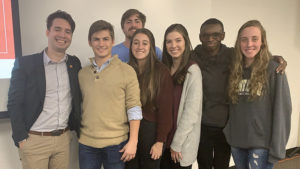
Guilarte recalls one student who spoke with him after a presentation. This student supported Bernie Sanders at the time. Guilarte stayed in touch with him and suggested articles for the student to read. Two weeks later, the student reached out to tell Guilarte that he was no longer going to vote for Sanders.
This vignette conveys the power of information and how many college students are simply misinformed about the economic realities of socialism. When they have the proper tools and objective facts in front of them, they can analyze these systems for themselves and come to their own conclusions about the value of free markets.
A WARNING TO THE U.S.
Guilarte says that he loves his job. He believes in the importance of sharing the truth about socialism, especially in the U.S., which has stood as a touchstone of democracy for over 200 years. He sees a huge amount of misinformation about different economic and political systems here, especially socialism.
“When it comes to socialism, Venezuela is the perfect example of how dangerous that ideology and economic system is,” says Guilarte.
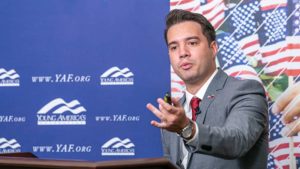
Guilarte sees it this way: before Chavez’s election, if there had been more advocates in Venezuela teaching what TFAS is teaching, then perhaps socialism would not have prevailed. But there was no one investing in sharing the truth or explaining the shortcomings of socialism. Guilarte believes the U.S. is now at the brink of a similar situation as Venezuela was in the early 1990s.
“This is the time to educate and to try to cure the disease in America before it gets too bad to resolve,” Guilarte says. “That’s why it’s important for me to spread the truth. College campuses are the perfect place to do that. We have to reach the students, the future leaders.”
Though it can be challenging to maintain motivation sometimes, Guilarte highlighted two things that keep him going. One is that Venezuela’s crisis continues, and he wants Americans to know the truth about what is happening there so the U.S. can make informed decisions. The other is that he sees how more young people are turning toward socialism, and he understands that there is little hope for the rest of the world if the U.S. becomes a socialist country.
I think that the U.S. is a wonderful country that deserves that we fight for it…. People may have a different perspective of what freedom is, but everyone agrees that freedom is the ultimate goal of the United States.” – Andrés Guilarte
Guilarte says Americans do not always realize the importance of their country on the global stage, but they must realize what this country means to others throughout the world.
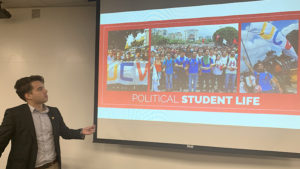
“I think that the U.S. is a wonderful country that deserves that we fight for it,” says Guilarte. “I’m not American, but I feel American in the sense that being American is having a shared set of values.”
Guilarte explained further:
“Each state and each community is different. At the same time, the whole country shares the same value of freedom. People may have a different perspective of what freedom is, but everyone agrees that freedom is the ultimate goal of the United States. And I think that’s wonderful.”
To learn more about Guilarte’s work through the Venezuela Project, visit TFAS.org/Venezuela.

